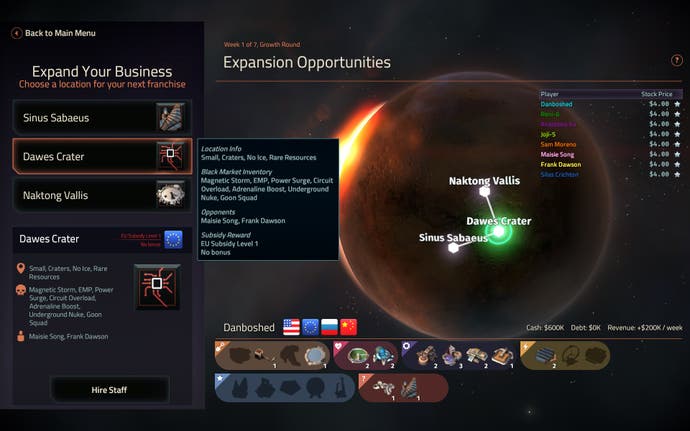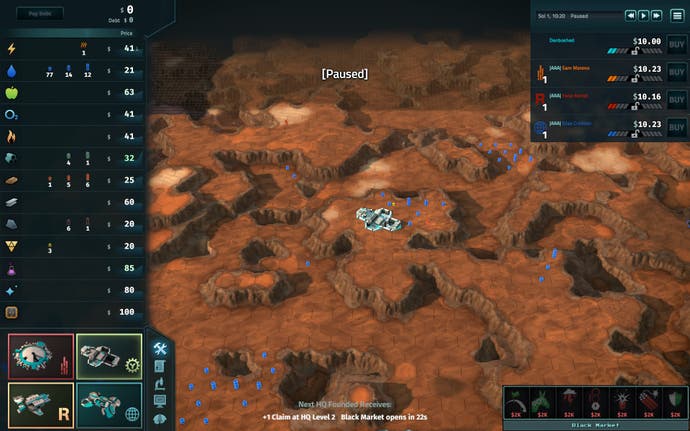Offworld Trading Company review
Economy of Style.
I'll begin with this, so as to establish my position. I am a terrible capitalist.
I come from a background in which there is an inherent guilt associated with wealth. Not one of radical communism or fierce anarchy, but that quietly parochial English shame which afflicts all matters pecuniary. As much as I'd like to claim this as a moral victory, born of a desire for fiscal equanimity, I suspect it's actually a simple consequence of a naturally feckless inflection: I do not manage money well.
It translates to many of my gaming experiences. I fritter on nonsense, rather than saving up for the game changers, buying useless improvements and ignoring spectacular opportunities. In almost everything I play with any sort of economic system, be it based upon gold or gems or souls or koala bears, I am perpetually impoverished.
So whilst it comes as no surprise that I am not particularly good at Mohawk's fiercely financial strategy debut, it has caught me somewhat off guard to find that I actually rather enjoy it. Honestly, I didn't at first, but Mohawk is headed up by Soren Johnson, the man who was lead designer of Civ 4. By virtue of his being in charge of officially one of the Greatest Games of All Time, I persevered in the face of my own ineptitude, and soon the pennies began to drop.
Offworld Trading Company is an economic RTS. There's no combat, no direct unit control. The entire left hand side of the screen is dominated by a constantly fluctuating market of a dozen or so resources, each noting the rate of spend or accumulation in your personal stockpile, your total holding and the all important sale price. To get resources, you must build, placing solar panels or steel mills or carbon scrubbing units on the hexes of the Martian surface.

Everything is related. Power is essential. Everyone needs it, and if you're running at a deficit it accumulates a rapid and often debilitating debt. Fuel powers the scudding barges which ferry your resources from your mines and refineries. For most factions, you'll also need water, food and oxygen to get by, with a natural consumption rate necessitating purchase at market prices if you're not producing enough of your own. Further down this hierarchy of needs come metals: aluminium, iron and the more valuable refined steel. Then there are the elemental resources of carbon and silicon, each essential to the higher-end commodities of chemicals, glass and electronics.
The relationships between these thirteen things is ostensibly simple, but quickly resolves into a densely integrated clockwork web of dependent markets, subtle algorithms and tightrope ledgers. Because each faction has a limited number of land claims it can establish on hexes before it must expand its headquarters, (which in itself both costs resources and results in a higher rate of their consumption,) the early game often consists of establishing the production of essentials. But resources are limited, often brutally so, and failing to secure the map's prime source of a more advanced material quickly can prove disastrous, particularly when there are up to seven opponents all trying to do the same thing at once.
Make too many hasty grabs at lush stacks of carbon, though, and you could find yourself being crippled by extortionate food costs or the constant electricity bills. Every stage of expansion requires quick, accurate decisions, assessing what each map has to offer and guessing at the priorities of your rivals. Perhaps you can ignore food for now (or forever if you choose the robotic faction) paying the initially low prices to import it whilst you build a monopoly on silicon to dominate the lucrative late game glass and electronics market. But that silicon is useless unless you have the spare claims to build the factories to refine it, and won't be much use to sell as a raw resource until demand for its pricier end-products drives up the cost.
In addition, every sale you make affects the market, for every player on the map. Notice that another corporation is building a chain of chemical factories? Perhaps now would be a good time to flood the market with the stockpile you've already tucked away, forcing down the price and their eventual margin. If you're sitting on the best source of iron this side of Mount Olympus, maybe it's a good idea to go big on steel, which almost everyone will need to build factories, extractors and HQs: If you've got it all and you're not selling, prices will soar, making expansion prohibitively expensive, pushing those peasants into the red without ever selling an ingot.

Of course, it wouldn't be capitalism unless you could make exponential gains on positions of power and privilege. In most game modes, the brilliantly replayable single player campaign aside, each contender has a share price determined by your holdings. Once you've got sufficient capital, you can start to buy out the opposition's shares, or purchase more of your own company to make it more difficult for them to reciprocate the favour.
Buying up to 50% of a firm can be done incrementally, but share purchases are transparent, giving the nod to your aspirations, and players will react quickly to these perceived threats: once half a company's stock is owned externally, you'll be able perform the fiscal coup de grace of an aggressive takeover, buying out the original owners completely and forcing them to become your subsidiary. Buyout everyone and you're crowned CEO.
Like any good industry, there's also plenty of dirty tricks. Each scenario has a black market, offering a selection of underhanded methods for getting ahead. You might decide to operate fairly subtly, bribing the land commission for extra claims or giving your workers a dose of the ol' money glands to double production. You might be more overt, causing electrical storms or power surges that incapacitate and overload enemy buildings. Or you could just blow stuff up with dynamite and subterranean nukes. All in a day's accounting.
There's more. Faction bonuses which let you ignore certain resources or build in advantageous ways; special buildings which enable massive boosts in efficiency, direct market manipulation or the eponymous Offworld Trading. The extensive single player campaign takes an almost entirely different cast, controlling a single persistent corporation across a series of encounters which all lend their cascading profits or losses to your long term war chest, completely eschewing the key mechanic of buying out opponents' stock in favour of investing in buildings for a central neutral colony and only allowing the tooth and nail of aggressive takeovers on the final maps.
And all this in games which will frequently clock in at under thirty minutes. It's remarkably intricate, and for a game which makes a great deal of not requiring a Starcraftian APM in its marketing, it's genuinely intense. Playing against the AI means you can pause and take stock, sometimes literally, but once you're in the mix with other humans, there's no respite at all. A tremendous score also swells throughout, courtesy of Johnson's Civ 4 comrade Christopher Tin, pulsing and driving the frenetic juggling of environment, price and material.

Like I said. I'm not that good at it. It's a difficult, cerebral game, dense with rapidly shifting complexities and massive swings in advantage. There's a pretty thorough set of tutorials which do a decent job of explaining the basic mechanics, but once the training wheels come off and you're exposed to the full force of the free market, it quickly becomes clear that there are few prisoners in finance. The AI becomes brutally efficient very quickly, executing strategies with a sometimes unfair alacrity and grace, seeing the all of the numbers at once in a way unparalleled by all but the most specific of human minds. Online play can be a bloodbath, too, as skilled operators rapidly extinguish their less adept fellows in fell swoops which can easily blindside even experienced players who lapse in concentration.
Everything moves very quickly and very precisely. The central economic model at the core of experience performs impeccably, and never once does it feel unfair. I often found myself mystified as to which part of the the process I'd fudged, which column I'd failed to account for, but I never once doubted that I'd deserved it.
All the same, it's not a game which even attempts to have a broad appeal. This is a niche within a niche: brilliantly carried out, but so precise in its incision that it will undoubtedly leave many cold. This is not Civ. This is not Sim City or Anno 2205. This is a distilled, exact and pure expression of the brutal mechanics of capitalism, and the lack of emerging narrative to accompany the stream of numbers leaves a gap: you won't be recounting many stories about how you built these empires, as you might in broader grand strategy titles. Although there's clearly been an effort to assuage that clinical nature by adding personality to factions or a pervasive sardonic overtone to the in-game commentary and incidental texture, this is unashamedly about making the numbers go up.
In a sense, that's the raw truth behind almost any game, and the level of window dressing applied to it is often a key factor in the mechanisms by which that is achieved. Here, everything is on show, you're fully behind the curtain. As such, the clearest appeal is to Directors, and the peaks of its appeal are likely limited to relatively few, but there are gems at its core well worth extracting.


